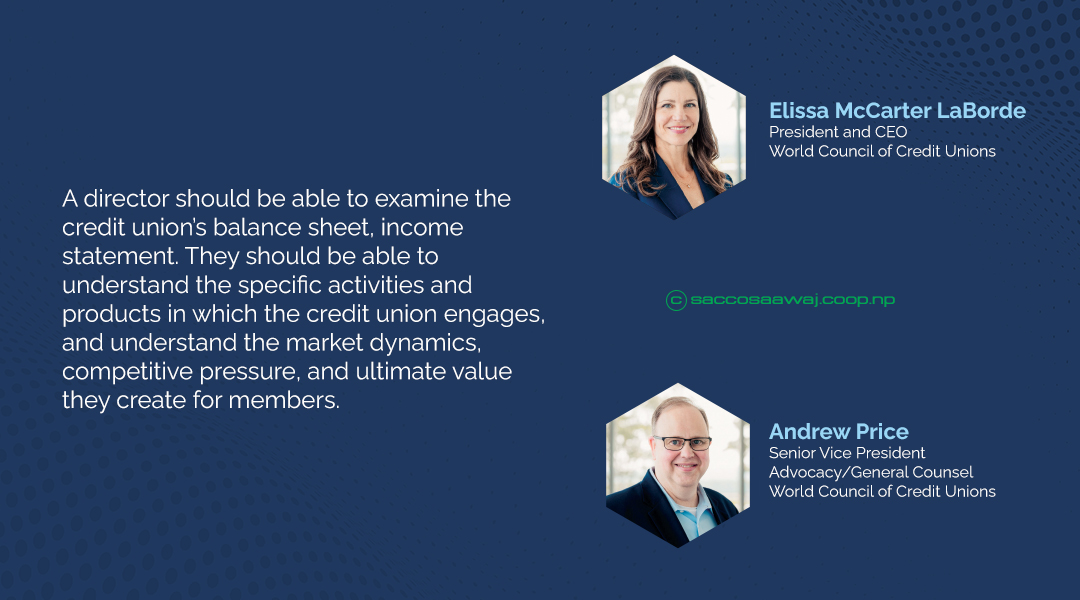
The World Council of Credit Unions (WOCCU) endorses the International Operating Principles for Credit Unions. It is the foundation of how a credit union is formed, operates, and ultimately shapes how it serves its members These principles are tried and true and when implemented properly allow a credit union to maximize the benefits of its operations for its members. It is particularly well suited to serve those who are underserved and marginalized. The core principles are as follows:
Cooperative Structure:
− Member Owned
− Member Controlled
− Democratic Control
Service to Members
− Financial Inclusion
− Financial Sustainability
− Maximizing Member Economic Benefit
Social Responsibility
− Financial Literacy
− Network Cooperation
− Community Responsibility
− Global Vision
Credit union industry professionals know and live by these principles, but alas, implementing them in today’s world of constant change can present a challenge. Technological advancements have revolutionized how we deliver financial services and manage risk; climate change is redefining how we think about sustainability and serving the more vulnerable communities; and the interconnectedness of markets and dependency on data platforms, introduction of digital currencies, and onslaught of new or changing regulations are all major trends that affect credit union operations and sound oversight of them. This is particularly true for board governance.
The principle of member controlled, and democratically controlled means that the membership gets to select who will sit on the board of directors. This is critically important so that the members get to decide who will shape the policies of the credit unions thus ensuring that the institutions will continue to serve the best interests of collective membership.
The challenge for credit unions is that credit unions have field of membership requirements and often serve a particular industry or trade or even perhaps a small community. This inherently limits the pool of people who are available or willing to serve on the board. Board service is typically done on a volunteer basis and requires a commitment of time. Therefore, it can be challenging to form a board comprised of people that bring the necessary experience, talent, and diversity of viewpoints that an ideal board composition should have.
At a minimum, a director should be able to examine the credit union’s balance sheet, income statement. They should be able to understand the specific activities and products in which the credit union engages, and understand the market dynamics, competitive pressure, and ultimate value they create for members. They should have a basic understanding of how those generate revenue. Importantly, they should understand the risks associated with those activities.
At a more general level, an understanding of credit, liquidity, interest rate, compliance, strategic, transaction and reputation risk is fundamental to being able to guide the credit union in a safe and sound manner. On the product side, credit union boards must be aware of best-in-class practices on listening to the customer (member) and customer (human) centered design, which increasingly means a sound data strategy to achieve a more segmented approach to serving members and understanding their needs. Finally, board members must understand the controls (internal and external) that need to be in place to account for these risks.
These requirements may sound daunting and present a challenge for those who want to serve on the board. Many times, the available candidates for a position are highly skilled, educated and capable, just not at running a credit union. The challenge for credit unions is to not discourage candidates from applying but to have available the necessary investment needed to allow them to acquire these skills within a reasonable amount of time.
As such, there are a few strategies to deal with this. First, have staggered board terms so that the entire board does not turn over in one year. This allows for a continuation of knowledge while giving new members time to gain the necessary knowledge. Second, allow six months after an election to obtain the necessary training to obtain the requisite skills. Several jurisdictions around the world allow for this time by virtue of their regulations. Third, consider allowing potential board members to serve in an advisory role or on a board-appointed committee prior to running for an election.
This can help train them and gain familiarity before they are ever elected to the board. Consider an advisory committee to the management, comprised of external experts that round out any gaps in expertise and can also enhance the board’s understanding of strategic issues the credit union is facing, for example, around change management requirements and capital investment in digital transformation.
Finally, consider ways to invest in young leaders, women, and those from less represented or minority member groups in order to actively promote and cultivate candidates who could run for board seats in the future. The business case of diverse voices and perspectives on the board is well proven; the execution of how to cultivate a diverse board drawn from its membership requires an intentional focus, awareness raising, and targeted investment.
These are several initiatives that we see around the world that will help to strengthen your board. Having a talented board with diverse viewpoints and evolving with the changing times helps us to implement those cooperative principles that have been the key to credit unions’ success for a long time. Let’s keep it going.